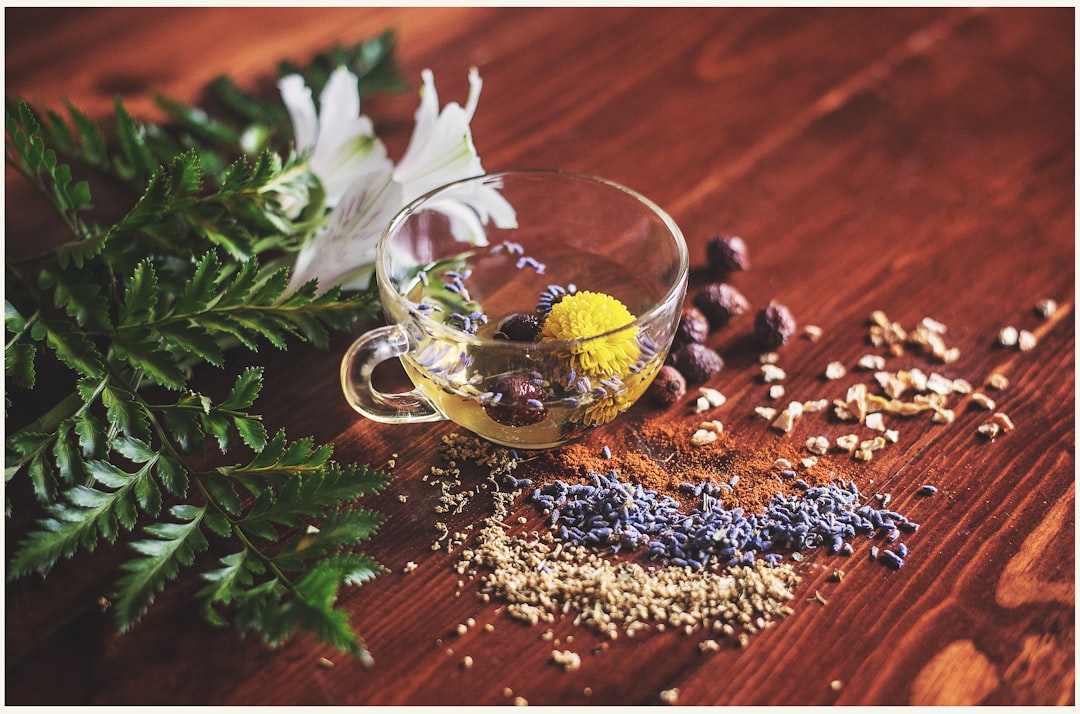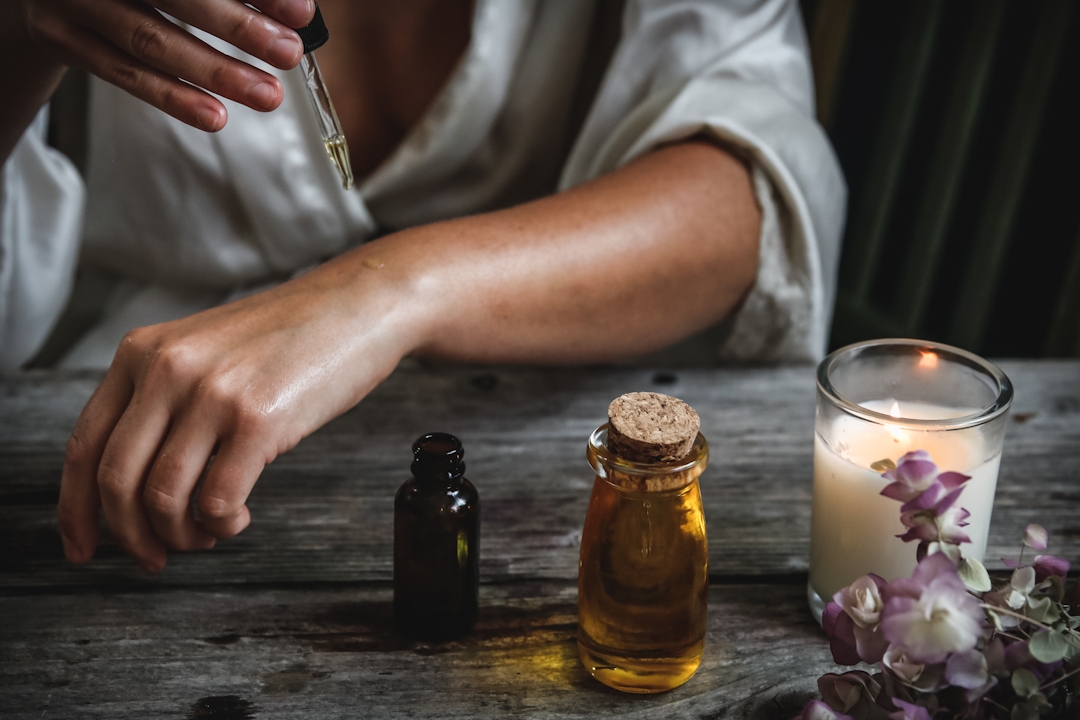
Herbal Teas vs. Essential Oils: Which Natural Remedy is Best for Stress Relief?
Explore the benefits of herbal teas and essential oils for stress relief, and discover which remedy suits your needs best.

Audio Summary
Key Takeaways
- herbal teas offer gradual stress relief
- essential oils provide quick relief
- herbal teas are best enjoyed as a warm drink
- essential oils are versatile for aromatherapy or topical use
- combining both can enhance overall well-being
Natural Stress Relief: Herbal Teas vs. Essential Oils
In today's fast-paced world, stress has become a common companion for many. As people seek natural ways to unwind and relax, two popular options have emerged: herbal teas and essential oils. These time-honored remedies have been used for centuries to promote calmness and well-being. The Power of Nature: Both herbal teas and essential oils offer unique benefits for stress relief, drawing on the power of plants to soothe our minds and bodies. While they share a natural origin, they work in different ways to help us find balance and tranquility in our daily lives. Herbal Teas: Herbal teas are infusions made from various plant parts, including leaves, flowers, roots, and stems. When consumed, they deliver their beneficial compounds directly into the body through digestion. Essential Oils: Essential oils are concentrated plant extracts that capture the plant's scent and flavor, or 'essence.' They are typically used aromatically or topically, allowing their compounds to be absorbed through inhalation or the skin. Choosing the Right Option: Understanding the differences between herbal teas and essential oils can help you choose the best option for your personal stress relief needs. Consider factors such as method of use, speed of effect, personal preferences, and specific stress-related symptoms. By exploring these natural remedies, you can find an effective and enjoyable way to manage stress and promote overall well-being in your daily life.
The Soothing Power of Herbal Teas for Stress Relief
Herbal teas offer a soothing way to unwind and combat stress. These natural brews, made from various plant parts, each possess unique calming properties. When you drink herbal tea, you're not just enjoying a warm beverage; you're also consuming beneficial compounds that can help your body and mind relax.
Popular Stress-Relieving Herbal Teas
- Chamomile Tea: Well-known for promoting relaxation, and improving sleep quality.
- Peppermint Tea: Eases digestive discomfort often linked to stress.
- Lemon Balm Tea: Reduces anxiety, and boosts mood.
Benefits of Herbal Teas for Stress Relief
- Natural Compounds: Herbal teas contain beneficial plant-based compounds that promote relaxation.
- Calming Ritual: The process of preparing and sipping tea can be a calming experience, providing a moment of pause in a busy day.
- Safe and Gentle: Unlike some stress-relief methods, herbal teas are generally safe, with few side effects when consumed in moderation.
- Variety: A wide range of herbal teas allows you to choose flavors and benefits that suit your preferences and needs.
By incorporating herbal teas into your daily routine, you can create a natural and enjoyable way to manage stress and promote overall well-being.
Essential Oils: A Powerful Aromatic Approach to Stress Relief
Essential oils offer a potent and aromatic method for combating stress. These concentrated plant extracts are typically used through inhalation or diluted application on the skin, providing fast-acting relief due to their quick absorption.
Popular Essential Oils for Stress Relief
- Lavender Oil: Calms the mind, Promotes better sleep
- Bergamot Oil: Lifts mood, Reduces anxiety
- Frankincense Oil: Promotes a sense of peace and well-being, used for centuries in traditional practices.
Methods of Use
- Diffusion: Release the aroma into the air
- Bath: Add a few drops to warm bathwater
- Topical Application: Mix with carrier oils for massage
Benefits of Essential Oils for Stress Relief
- Potency: A little goes a long way due to their concentrated nature
- Quick Action: Fast-acting relief through inhalation or skin absorption
- Versatility: Various application methods to suit individual preferences
- Aromatherapy: Scents can directly influence mood and stress levels
Safety Considerations
While essential oils are powerful stress-relief tools, it's crucial to use them safely: follow recommended dilution ratios, perform patch tests before widespread use, be aware of individual sensitivities, consult a healthcare professional if pregnant, nursing, or have specific health concerns. By incorporating essential oils into your stress-management routine, you can harness the power of nature's most concentrated plant essences for relaxation and well-being.
Choosing Between Herbal Teas and Essential Oils for Stress Relief
Deciding between herbal teas and essential oils for stress relief depends on your personal preferences and lifestyle. Both offer unique benefits and understanding their differences can help you choose the most effective method for your needs.
Factors to Consider:
| Category | Herbal Teas | Essential Oils |
| Speed of Relief | Gradual effect | Quick relief |
| Method of Use | Ingestion, sipping throughout the day | Aromatherapy, topical application |
| Personal Preferences | Enjoying a warm drink | Incorporating into skincare or aromatherapy routines |
| Duration of Effect | Can be consumed throughout the day | Ideal for specific moments or before bed |
| Combining Methods | Teas during the day, oils before bed or for quick relief | Using both methods can work well |
| Individual Variation | Effects vary per person; experiment to find what works | Effects vary per person; experiment to find what works |
| Safety Considerations | Consult a healthcare professional if concerns arise | Consult a healthcare professional if concerns arise |
Remember, the best stress-relief method is one that you enjoy and can consistently incorporate into your daily routine. Whether you choose herbal teas, essential oils, or a combination of both, finding a natural way to manage stress can significantly improve your overall well-being.
Natural Stress Relief: Herbal Teas and Essential Oils
In conclusion, herbal teas and essential oils offer complementary natural approaches to stress management, each with distinct advantages. Herbal teas provide a gentle, long-lasting effect through the act of drinking and the calming properties of herbs, while essential oils offer quick relief through aromatherapy and topical application. The choice between these methods depends on personal preferences, lifestyle, and the desired speed of stress relief, with some individuals benefiting from a combination of both. When exploring these options, it's important to listen to your body, experiment with different teas or oils, and observe their effects on your stress levels. Ultimately, the most effective stress-relief method is one that you enjoy and can consistently incorporate into your daily routine, potentially improving your overall quality of life. As with any health-related practice, consulting a healthcare professional may be advisable when integrating these natural remedies into your stress management strategy.
References
- Aroma Essence Institute. (2024). The Benefits of Using Essential Oils vs Herbs: Understanding Their Differences. Retrieved from https://www.aromaessenceinstitute.com/blog-post5
- Healing Harvest Homestead. (2018). Herbs vs. Essential Oils: Thoughts from an Herbalist and Aromatherapist. Retrieved from https://healingharvesthomestead.com/home/2018/8/17/herbs-vs-essential-oils-which-are-best
- Medical News Today. (n.d.). 10 Natural Remedies for Reducing Anxiety and Stress. Retrieved from https://www.medicalnewstoday.com/articles/322396
- Dr. Axe. (2024). 11 Healthiest Herbal Tea Options, Benefits, How to Make. Retrieved from https://draxe.com/nutrition/herbal-tea-benefits/
- Healthline. (n.d.). 10 Healthy Herbal Teas You Should Try. Retrieved from https://www.healthline.com/nutrition/10-herbal-teas

Related Blog Content

Discover Aromatherapy: Essential Oils for Holistic Healing and Relaxation
Explore how essential oils can enhance well-being and relaxation through the power of aromatherapy in holistic healing.
Read More
Top 10 Herbal Remedies to Naturally Treat Common Ailments and Boost Your Health
Discover effective herbal remedies to naturally alleviate common ailments and enhance your overall health and well-being.
Read More
Stress-Free Living: Effective Techniques for Managing Daily Stress and Enhancing Well-being
Discover practical strategies to manage daily stress and boost your overall well-being for a healthier, happier life.
Read MoreReady to optimize your biology?
Nutritionaly is free to start. Build better habits, unlock insights, and watch your Bio-Score rise.